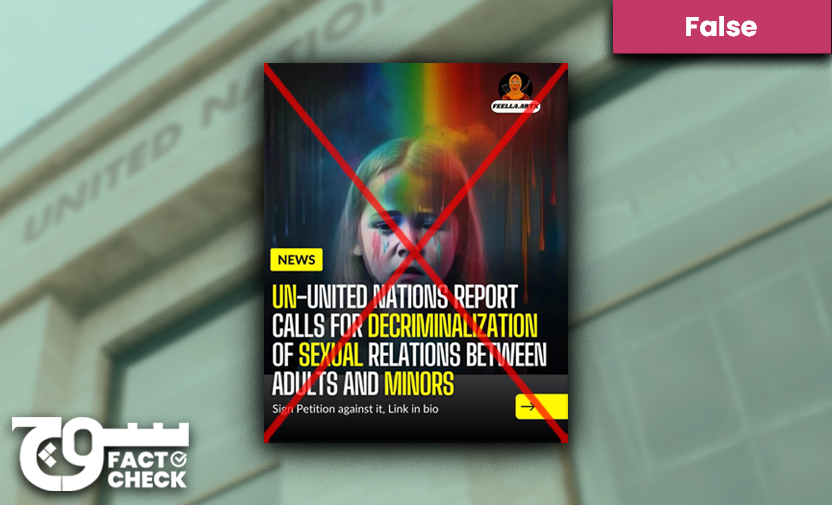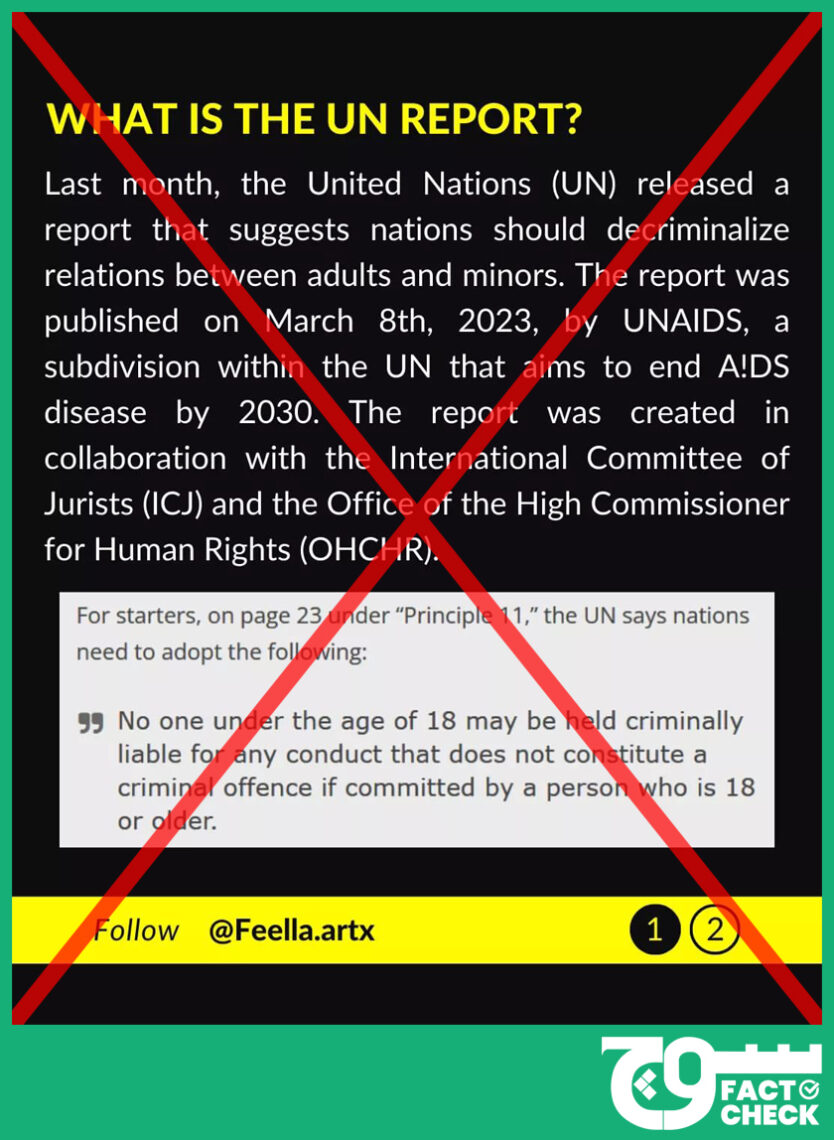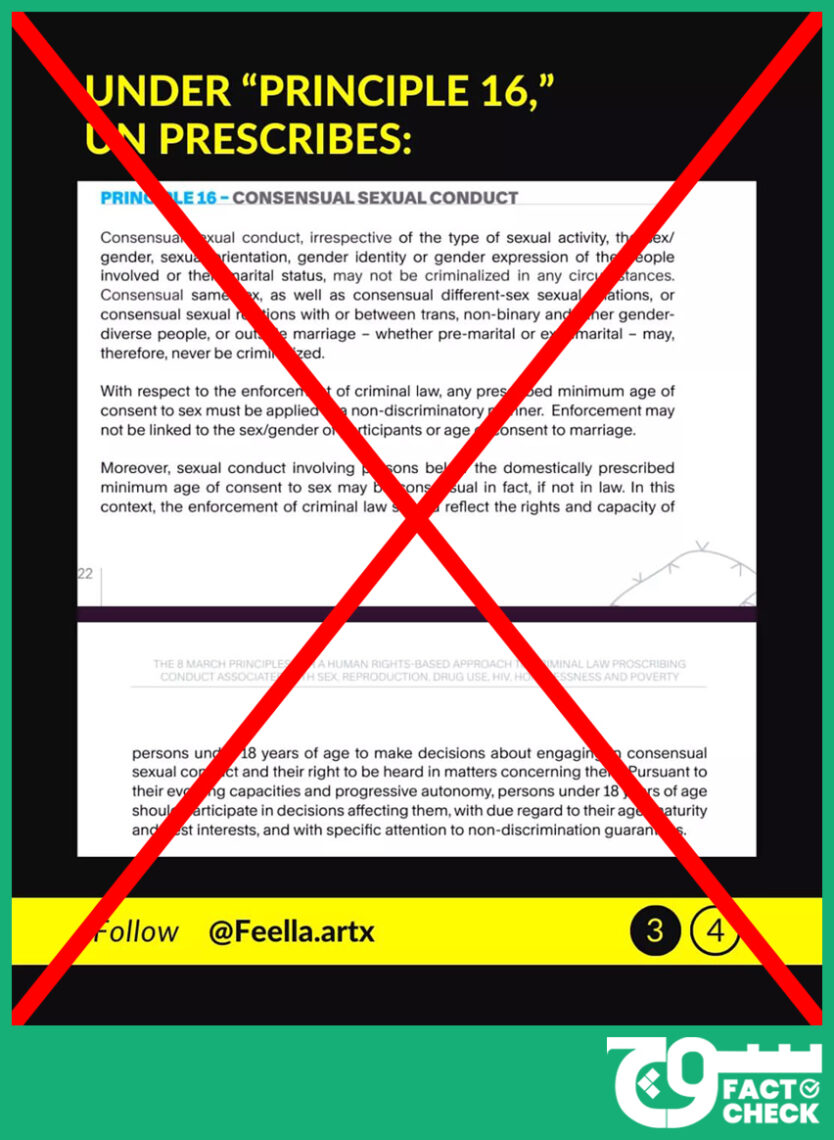
Claim: Instagram user @feella.artx has claimed that a March 2023 report is proof the UN has called for the decriminalisation of sexual relations between adults and minors.
Fact: The claim is false. A report prepared by the ICJ, UNAIDS, and the OHCHR provides a guideline on the application of criminal laws. It includes suggestions on legislation pertaining to sexual activities, calls for the minimum age of consent laws to be enforced in a non-discriminatory manner, and underlines the human rights impact of criminal laws. However, it has not called for decriminalising sexual relations between adults and minors.
On 21 April 2023, Instagram account @feella.artx uploaded a carousel post (archive) comprising several visuals that allege a report by the United Nations (UN) has called for the decriminalisation of sexual relations between adults and minors.
The visual of a child with a sad expression doused in rainbow colours, hinting at LGBTQ pride, is captioned as follows:
“Sign the petition, Link mentioned in bio! Use mentioned hashtags. Tag government officials, Tag all social media influencers. This need to be stopped! Show the resistance!”
The claim has been shared in light of recent backlash against the transgender community, wherein some public figures have alleged that the movement for transgender rights is normalising and legalising paedophilia — through what anti-trans voices say is “grooming”.
Fact or Fiction?
The claim is a distortion and misrepresentation of a report published on 8 March 2023 by three organisations, which include the International Committee of Jurists (ICJ), the Joint United Nations Programme on HIV/AIDS (UNAIDS), and the Office of the High Commissioner for Human Rights (OHCHR).
The report — titled “The 8 March Principles for a Human Rights-Based Approach to Criminal Law Proscribing Conduct Associated with Sex, Reproduction, Drug Use, HIV, Homelessness and Poverty” — lays out “expert jurist legal principles to guide the application of international human rights law to criminal law”.
It states, “criminal law is among the harshest of tools at the disposal of the State to exert control over individuals” and that “globally, states have exhibited a growing trend towards overcriminalisation”.
Therefore, “generally, criminalisation in the above-mentioned contexts does not further the stated goals of the criminal law,” it reads.
In simple terms, the framework lays out ways for those working in the legal field to understand criminal laws and their harmful impact and how such legislation may, in turn, violate international human rights laws.
The report was published after five years of extensive work by jurists and legal practitioners, human rights defenders, academics, as well as civil society organisations following a 2018 meeting.
The ICJ, which was established in 1952, comprises 60 judges and lawyers from across the world and works to promote and protect human rights.

The second visual of the carousel post by @feella.artx omits Principle 11, which is: Limitations of criminal liability for persons under 18 years of age. The principle reads, “No one under the age of 18 may be held criminally liable for any conduct that does not constitute a criminal offence if committed by a person who is 18 or older.”
A simple reading of the aforementioned paragraph is enough to understand that the framework upholds not criminally charging a minor for conduct that is not a crime for adults. Principle 11 states that an act or behaviour that is not a crime if carried out by an adult should also not be a crime if a minor does it.

The fourth visual of the carousel post by @feella.artx is about “consensual sexual conduct” and includes the following three paragraphs from The 8 March Principles:
“Consensual sexual conduct, irrespective of the type of sexual activity, the sex/ gender, sexual orientation, gender identity or gender expression of the people involved or their marital status, may not be criminalised in any circumstances. Consensual same-sex, as well as consensual different-sex sexual relations, or consensual sexual relations with or between trans, non-binary and other genderdiverse people, or outside marriage – whether pre-marital or extramarital – may, therefore, never be criminalised.
With respect to the enforcement of criminal law, any prescribed minimum age of consent to sex must be applied in a non-discriminatory manner. Enforcement may not be linked to the sex/gender of participants or age of consent to marriage.
Moreover, sexual conduct involving persons below the domestically prescribed minimum age of consent to sex may be consensual in fact, if not in law. In this context, the enforcement of criminal law should reflect the rights and capacity of persons under 18 years of age to make decisions about engaging in consensual sexual conduct and their right to be heard in matters concerning them. Pursuant to their evolving capacities and progressive autonomy, persons under 18 years of age should participate in decisions affecting them, with due regard to their age, maturity and best interests, and with specific attention to non-discrimination guarantees.”
The aforementioned excerpt states that engaging in consensual sexual activity should not be criminalised under any circumstances. It does not state that sexual activity between adults and minors should be decriminalised.
The second paragraph stresses that there should be no discrimination in applying criminal law pertaining to the prescribed minimum age of consent to sex. It also emphasises that the minimum age of consent to sex is not always the same as the minimum age of consent to marriage.
Lastly, the third paragraph details that while an individual who is under the “domestically prescribed minimum age of consent to sex” may engage consensually in sexual activities, it may not be lawful in their respective jurisdiction. However, it stresses that if criminal law is being enforced against a person under the minimum age of consent to sex, it should also take into account their rights and capacity to make such decisions about sex and their right to be heard in anything that concerns them.
Those who are under the age of consent to sex are growing individuals and have “evolving capacities and progressive autonomy”; therefore, the report states that they should be heard and their “age, maturity, and best interests”, as well as “non-discrimination guarantees” should be considered at the same time.
In no place in the aforementioned paragraphs has the ICJ, UNAIDS or the OHCHR called for the decriminalisation of sexual relations between adults and minors.
UN, ICJ rebut misleading reports
In addition to this, Stéphane Dujarric — the spokesperson for UN Secretary-General António Guterres — addressed the false claims in an 18 April 2023 press briefing (archive), terming it “malicious misreporting”. The 8 March Principles “did not call for the decriminalisation of sex with children, nor did it call for the abolition of the age of consent”, he added.
Dujarric said, “The International Commission of Jurists report set out legal principles to guide the application of the international human rights law to criminal law across a range of issues. In the application of law, it is recognised that criminal sanctions are not appropriate against adolescents of similar ages for consensual non-exploitative sexual activity. So, too, it is recognised that adolescents should not be prevented from accessing health services, which protect them. The UN is resolute in fighting the sexual exploitation of children, upholds that sexual exploitation and abuse of children is a crime, and supports countries to protect children.”
The ICJ also put out a statement on 20 April 2023 (archive), saying the UN’s commitment to fighting children’s sexual exploitation of children and The 8 March Principles have “been seriously misrepresented on a number of social media and websites”.
“The 8 March Principles do not call for the decriminalisation of sex with children, nor do they call for the abolition of a domestically prescribed minimum age of consent to sex. Indeed, the ICJ stresses that States have a clear obligation under international law to protect children from all forms of abuses, such as child sexual abuse, including through the criminalization of such conduct.
“The 8 March Principles are aimed at offering a clear, accessible and operational legal framework and practical legal guidance to parliamentarians, judges, prosecutors and advocates to address the harmful impact of criminalization of certain conduct on health, equality and other human rights. They are based on general principles of criminal law and international human rights law and standards,” the ICJ’s statement reads.
The claim has also been investigated and debunked by AFP Fact Check, PolitiFact, The Associated Press, and FactCheck.org — four outlets accredited by the International Fact-Checking Network (IFCN), of which Soch Fact Check is also a signatory.
The aforementioned outlets also sought comments from different academics focusing on law, such as Aziza Ahmed, Erin Murphy, Alexander A. Boni-Saenz, and Bridget Arimond — law professors at Boston University, New York University, Chicago-Kent College of Law, and Northwestern University School of Law — as well as Gerald Neuman, the professor of international, foreign, and comparative law at the Harvard Kennedy School, and Ton Liefaard, a professor of children’s rights at Leiden University.
Lastly, the document was written by the ICJ, not the UN, according to AFP, which cited the UNAIDS.
Virality
The post by @feella.artx has close to 660 likes and more than 60 comments. The Instagram user also created a Change.org petition (archive), which has received upwards of 1,000 signatures as of writing time.
The claim was also shared by a group of Instagram accounts that has been actively posting content against the transgender community in Pakistan; these include @_mariab_fatimab_, @monahusainh, @storyteller_sameer, @rajaziaulhaq, @no_to_lgbt_pakistan, @mardekaamil, @fatima_khanpk, @wisdom.speaks1__, @bilaalasiff_, @bilaalasiffbackup, @zarishkay, @zarishkaybackup, @feella.artx, @feella.backup, @qaaflah, @qaaflah.backup, @abdullahtariq, and @abdullahtariq_2.0.
The claim was also reported by Fox News here (archive), an American conservative news outlet, which Soch Fact Check investigated earlier as well. It was also shared by American anti-abortion activist Lila Grace Rose (archive), the president and founder of Live Action (archive), an anti-abortion organisation that often publishes false and misleading health claims, according to AFP Fact Check, which quoted NewsGuard.
It was also posted by right-wing commentator Ian Miles Cheong here (archive) and received more than 1.6 million views.
Conclusion: The claim is false. A report prepared by the ICJ, UNAIDS, and the OHCHR provides a guideline on the application of criminal laws. It includes suggestions on legislation pertaining to sexual activities, calls for minimum age of consent laws to be enforced in a non-discriminatory manner, and underlines the human rights impact of criminal laws. However, it has not called for the decriminalisation of sexual relations between adults and minors.
Background image in cover image: Jonathan Ansel Moy de Vitry
To submit an appeal on our fact-check, please send an email to appeals@sochfactcheck.com
